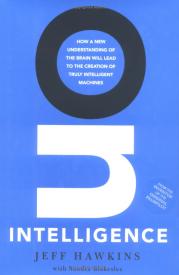Some Thoughts on On Intelligence by Jeff Hawkins
by David Ashley
April 3, 2007
 I loved the prologue and first few chapters of this book. Hawkins is passionate
about developing a theory of mind, about understanding how the brain works.
He wanted to pursue this but met with resistance -- no one wanted to finance
this research, in the 1980's it was too risky. Hawkins writes a lot about how
wrong the current approach to AI is. I agreed with everything he wrote. It
was very refreshing reading a lot of the same thoughts I've had myself.
I loved the prologue and first few chapters of this book. Hawkins is passionate
about developing a theory of mind, about understanding how the brain works.
He wanted to pursue this but met with resistance -- no one wanted to finance
this research, in the 1980's it was too risky. Hawkins writes a lot about how
wrong the current approach to AI is. I agreed with everything he wrote. It
was very refreshing reading a lot of the same thoughts I've had myself.
Then the book turns south. Hawkins has developed his own model for how the
brain works. He's the first to admit it's probably wrong and in need of work.
The basic theme of his model is that the brain is always trying to
predict what's coming next.
There is a lot of detail about his hierarchical model, how lower levels
pass their analysis of low level patterns up to higher levels, how higher
levels look for higher order patterns and pass their analysis up to
still higher levels. Then at the top there is the reverse, commands get
sent down the levels to initiate simultaneous playback of patterns out. When
the predicted patterns match the incoming ones, at every stage, the system
doesn't call attention to itself. Only when there is a disagreement at some
level is a higher level notified of the problem. Supposedly the higher level
can adapt and get things back on track.
I'm paraphrasing. Hawkins goes into a lot more detail. I only read it with
enough attention to get the gist of the theory. Basically it's nothing like
my own theories, so I only examined it to look for new insights and also for
the purpose of poking holes in it. I applaud Hawkins for his intricacy and
detail, how he's written it all down and published a book about it
for everyone to gawk at and criticize. However in the end I simply can't get
behind his approach.
Hawkins doesn't go into any detail about how the system learns these
patterns. Instead it's sort of given that the system starts out already having
the patterns programmed in, and once that has been done, it all works like...
this. Hawkins' hope is that by putting something down it can act
as a starting point. He encourages young scientists to pursue brain theory as
a career, to take chances, start companies. He freely gives away his ideas
in the hopes they'll assist entrepreneurs in forming businesses.
One thing I found particularly ironic about the schism between the first
part of the book (which complains about the gridlock present in current
GOFAI (Good Old Fashioned AI such as symbolic logic and neural nets)) and
the second part where he presents his theory, is that he himself
does exactly what he complains about early on.
Specifically, in chapter 2 on neural networks Hawkins describes an analogy.
The idea is to imagine people reverse engineering a computer, finding it's
built up of transistors, then discovering that putting a few transistors
together in a certain way makes an amplifier. Then this spawns new industries
that then make gadgets (and money) such as radios and tv's. However the problem
was that the original intent was to be able to reproduce the computer -- and
that wasn't done. The point is that people looked at neurons in the brain
and went off and invented neural nets -- which are useful (supposedly) for
some purposes, but are nothing like actual neurons in a nervous system.
He makes a wonderful point -- one I agree with wholeheartedly. But then
Hawkins himself did exactly what he warned us against. He developed an
incomplete theory of brain function, then went off and started a company
to exploit the theory. The company is Numenta. He also started an
institute intended to develop a complete theory of the brain, called the
Redwood Neuroscience Institute. Now, I think he started the institute before
Numenta. The institute seems to have been absorbed into the University of
California at Berkeley and Hawkins doesn't seem to be directly connected to
it as a driving force anymore. This separation seemed to coincide closely with
the founding of Numenta. I'm not sure of my dates + "facts". It's just my
intuition from piecing together the bits and pieces I've absorbed in the
limited time I've invested.
So Hawkins complains about people "selling out" and then goes and does it
himself! Note Hawkins is probably rich, rich, rich from success at Palm
Computing. He also probably made a few bucks from "On Intelligence" the book,
after all I acquired a copy somehow. So he doesn't need money.

Based on the little I know about the story, I consider Hawkins to have
committed a sin against his original passion. He's already rich. He's a smart
fellow. The correct thing would have been to stick around at this
Redwood Neurosciences Institute he founded, direct its efforts, and perhaps
even spend a bit of his own time developing his theory further.
Instead, Hawkins seems to have changed his focus to making a buck
by forming Numenta and trying to devise ways that his model of intelligence
can be implemented to solve real-world problems. This is a trajedy, for two
reasons. Firstly his passion would have lent a necessary driving force to
the Institute. I suspect in passing it off to UCB it will have lost whatever
sense of urgency it started with and will become just another think-tank,
producing nothing useful, and focusing mainly on locating grant money (ala
The Santa Fe Institute).
Secondly, Hawkins' theory is wrong. Trying to go for the $$$ with Numenta
means rather than form a complete correct theory, Hawkins will instead
focus on trying to squeeze out whatever money can be had with yet another
incorrect model of intelligence.
Numenta will probably make money. We'll probably see some very interesting
products come out of the place. But real deal intelligent machines?
Forget it.
Now I'll provide a bit of detail on why I think Hawkins' theory is wrong.
The main thing is, it's incomplete. Where does learning fit in? How does
the hierarchy get itself built? It is just a mechanism to record dynamic
patterns and play them back. How does this turn into an intelligent machine?
Hawkins presumably leaves this as an exercise for the reader. But the
critical essence of intelligence is learning itself. Hawkins has
no theory. It's just a description of one of the many symptoms of
intelligence -- pattern prediction -- and enough details of an algorithm
to implement it with typical digital hardware of the day.
When Hawkins speaks of symbols getting passed up and down the hierarchy,
when he speaks of sequential patterns (as in A, then B, then C, then D
occuring in rapid succession would become an ABCD pattern), right away I know
he's blown it. The brain doesn't work that way. The fundamental building
blocks in the brain are not symbols. Trying to define symbols and
work with them is a throwback to GOFAI. It's a dead end.
The learning comes first. The brain learns to create and
manipulate symbols. The symbols are a result of intelligence -- not the
basis. It's like this: I have a toolbox and I can fix cars when they break
down. A savage straight out of the jungle might see me fixing a car, then
might decide he wants to do that. So he steals my toolbox, thinking the toolbox
and the tools inside are the magic I have that let me fix cars. But
it won't work. The tools are not the magic. Symbols are tools.
I don't have a complete theory of the brain either. But at least I
know enough to keep working on the problem until it is complete. One
thing I'm sure of is that intelligence is an emergent phenomenon. As such
I see GOFAI and Hawkins' approach as essentially identical -- attacking
symptoms of intelligence instead of hitting the root causes.
Having said all the above, I still very highly recommend Hawkins'
book On Intelligence. If you're young and thinking of going into a
career in AI, please read this book, at least the first few chapters. Read
the first part because you really want to know what you're getting yourself
into. Hawkins blasts the traditional approaches to AI quite effectively.
Don't go down the same path academia has -- it's a dead end. Next, if you
do wish to go on and read the whole book and get introduced to Hawkin's theory,
take it with a healthy amount of skepticism. Just because Hawkins is smart and
rich and successful doesn't mean his theory is the truth.
Access count (e^i)
 I loved the prologue and first few chapters of this book. Hawkins is passionate
about developing a theory of mind, about understanding how the brain works.
He wanted to pursue this but met with resistance -- no one wanted to finance
this research, in the 1980's it was too risky. Hawkins writes a lot about how
wrong the current approach to AI is. I agreed with everything he wrote. It
was very refreshing reading a lot of the same thoughts I've had myself.
I loved the prologue and first few chapters of this book. Hawkins is passionate
about developing a theory of mind, about understanding how the brain works.
He wanted to pursue this but met with resistance -- no one wanted to finance
this research, in the 1980's it was too risky. Hawkins writes a lot about how
wrong the current approach to AI is. I agreed with everything he wrote. It
was very refreshing reading a lot of the same thoughts I've had myself.
